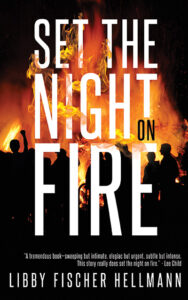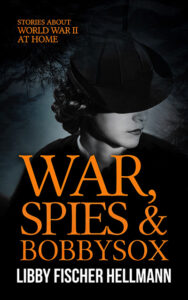 Series: The Saga Series #5
Series: The Saga Series #5Release Date: 2020
Genre: Historical Fiction
Buy the Book:
My books are still available wide, but you’ll find the best prices on my store, especially if you buy more than one novel. Check out the two and three book Bundles here:
Libby's Store
In 1968 two young Vietnamese sisters flee to Saigon after their village on the Mekong River is attacked by American forces and burned to the ground. The only survivors of the brutal massacre that killed their family, the sisters struggle to survive but become estranged, separated by sharply different choices and ideologies. Mai ekes out a living as a GI bar girl, but Tâm’s anger festers, and she heads into jungle terrain to fight with the Viet Cong. For nearly ten years, neither sister knows if the other is alive. Do they both survive the war? And if they do, can they mend their fractured relationship? Or are the wounds from their journeys too deep to heal? In a stunning departure from her crime thrillers, Libby Fischer Hellmann delves into a universal story about survival, family, and the consequences of war.
Honors and Accolades:
- Finalist, Foreword Magazine Indies Award, War and Military
- Finalist, IAN Books of the Year, Historical Fiction
- Finalist, 2020 Indies Next Generation Book Awards, Historical Fiction
Reviews:
In this richly drawn tour de force, Libby Hellmann paints an Asian family saga over two continents. Two sisters take different paths, struggle to confront the past, themselves, and each other. Highly recommended.
—Cara Black, NY Times Bestselling author of Three Hours in Paris
In a brilliant departure from her earlier work, award-winning thriller writer Libby Fischer Hellmann has crafted a stunning piece of historical fiction. A Bend in the River is the story of two Vietnamese sisters torn apart by the war that ravaged their nation. Writing from the perspective of these women whose homeland was so brutally devastated, Hellmann has turned her astute, poetic eye from the hellish battlefields to the details of the daily lives of ordinary people struggling through the morass of a long and bitter conflict. The result is a story that will force us all to look back on the Vietnam War with a different, and I believe kinder, understanding. This is an important novel that deserves a broad audience. Kudos to Hellmann for her courage in striking out in this bold, new direction.
—William Kent Krueger, NY Times Bestselling Author of This Tender Land
Sisters Mai and Tam’s very different paths to survival in war-torn Vietnam provide a compelling, page turning story. Hellmann brings history to visceral, tangible life by shining a light on torture from all sides of the conflict and shows the devastating effects on Vietnamese citizens. Questions of morality and justice are subtle in the point of view of each of the sisters who become different, yet equally sympathetic people in a trauma-filled world.
—Amy Alessio, BookReporter.com
Gripping…vivid detail… this passionate story of survival has staying power.
—Publishers Weekly
Libby Fischer Hellmann is at her best in this novel about Tam and Mai, teenaged sisters from the Mekong Delta, who bravely flee their destroyed village to support themselves in wartime Saigon. This gripping international saga illuminates the complexities of politics and loyalty and love, and is a powerful testament to the strength of women.
—Sujata Massey, Author, The Satapur Moonstone
A polished segue into historical fiction…simple but elegant prose… offers nuance and depth to a war we thought we knew but did not entirely understand.
—A.E. Feldman, BookTrib
Also in this series:
Excerpt:
Chapter One
Tâm
Is there a warning the moment before life shatters into pieces? A minute shift in the light? The chirr of a monkey? A heaviness in the air that tastes like disaster? For Tâm Trang and her sister, Mai Linh, washing their family’s clothes in the river, the warning might have been a barely perceptible scent wafting toward them. Perfumed soap mixed with sweat. Unfamiliar. Foreign.
Or perhaps there was no warning at all. Absorbed in their task, the sisters squatted on a narrow strip of shore, scrubbing shirts with their brushes. They slapped heavier items against the rocks, then rinsed everything in the waters of the Mekong. The clothes would dry quickly. The hottest part of the year was approaching, and the combination of summer heat and the monsoons would produce an indolent lethargy that made even washing clothes a burden. Though it was only March, the sisters lifted their hair off their necks to catch the breeze.
Tâm, at seventeen, used her nón lá as a hamper for the clean clothes. At the moment it held only two pairs of tiny pants belonging to her little brother. Hung Sang, an unplanned surprise five years earlier, was now the prince of the family. According to their parents, no boy was as handsome, as talented, as lucky. With his arrival the girls’ status declined. They had become afterthoughts, to be married off quickly. Sang should not be burdened with his sisters’ care. When he grew up, he would have enough to do for his own family and his parents.
Tâm wiped sweat from her brow. Mai, three years younger, nattered on, but Tâm only half listened. She was about to graduate from the Catholic school two villages away, and she was wondering how she would continue her studies. Where would she find the money to pay for university? What would her parents say when she confessed that was her goal?
“I’m sure you know him. Lanh Phuc. He’s handsome. His is the wealthiest family in their village,” Mai said. “Their home has a real roof. And windows. His father makes sampans…” Mai giggled. “I think he likes me, Chị Tâm. I hope Mama and Papa will agree to a match. I can already picture our wedding. Of course, we will honor the Rose Silk Thread God, but it will be modern too. We will have music to dance, and—”
Tâm cut in. “Mai, you can be a silly girl. Dreaming about weddings and dancing? This is a man you may live with the rest of your life. Have you ever shared a conversation? Talked to him about his future, his dreams?” She twisted water out her father’s shirt and dropped it into the conical hat. “All I hear is that he is the son of a wealthy man, and he is handsome.”
Mai was the beauty of the family, delicate and tiny, with large black eyes, silky black hair, and soft skin that glowed white, even in shadow. Tâm had seen the longing on village boys’ faces when she passed. Her parents would have no problem arranging a match for her. Tâm was taller, leaner, and while her face had the same classic features as Mai’s, they were arranged differently. Her eyes did not appear to be as large; her nose more pronounced, her skin darker. She was attractive in her own way, but she wasn’t a beauty. Although older, she wasn’t waiting for an arranged marriage. She wasn’t interested. She wanted to study plants: their growth, foliage, colors, blossoms, how they added to their environment or not. Her Catholic science teacher explained to her that what she wanted to study was “botany.”
Mai, who usually deferred to her older sister, drew in a breath. “You’re a fine one to talk. Do you have a suitor? You reject all the men our parents suggest.”
Tâm sat back on her haunches. When had Mai developed such a sharp tongue? This churlish behavior was new. As Mai’s chị, the older sister, Tâm should be treated with respect. She was about to say so when a wisp of smoke passed over them.
Tâm sniffed. The scent of the smoke was farm-like. Clean. The end of the dry season was approaching. A farmer was probably burning leftover corn husks or rotted fruit from his fields. Except that most farmers usually fed leftovers to their cattle or pigs. She frowned. Perhaps the smoke came from the dying embers of a campfire around the bend of the river. A fisherman or two cooking breakfast before a long day on the Mekong.
A second puff of smoke wafted over them. Stronger. This time it carried with it an acidic scent. Gasoline. Tâm’s jaw tightened. She looked over at Mai, whose eyes grew round.
“Do you smell that?” Mai asked.
When the third gust of smoke reached them, even more intense, Tâm scrambled to her feet and beckoned to Mai. “Leave everything. We need to go home.”
Chapter Two
Tâm
When the Japanese occupied Vietnam during World War Two, a platoon of soldiers seized the village. Those who stayed wanted easier access from the river. So they supervised the construction of a dock and steps leading from the river’s edge up a hill. The steps ended at the dusty road leading into the village. Tâm and Mai’s father had been conscripted to build the dock and steps in his teens, and his back bore the scars of beatings, an indispensable tool of Japanese brutality. Despite their harsh treatment, though, most of the villagers were pleased when the steps were finished. Outsiders could now be spotted as they approached, and villagers could determine whether they were friend or foe.
Yet it was still possible to climb the hill a dozen yards north of the dock. Under cover of cashew bushes, papaya, and jackfruit trees, one could secretly enter the village at its mid-point. Tâm and Mai took that route. As they hiked up the hill, a cacophony of sounds washed over them. Somewhere far above was a distant thwup of helicopter blades. On the ground screams of terror. The occasional crack-spit of gunshots. The yelp of a dog that suddenly stopped. The squeal of a pig. Mechanical voices, as if someone was talking on a radio. And above it all, the thick flat voices of men bellowing in what Tâm knew was English.
She froze. Americans. How had they found their tiny village? Not by water; Tâm and Mai would have seen them. But the land route was overgrown with dense forest and bush, impenetrable in some spots. They must have come that way.
She worried about the helicopters. She’d heard how the U.S. dropped powerful bombs that erupted into fire, scorching everything on the ground. When the last flame was extinguished, the Vietnamese were left with barren fields and poisoned land unable to grow anything. The government said this was the only way to force the North and Viet Cong into the open, to halt their guerrilla war. She’d heard, too, that Americans liked to execute the VC they found, set fire to their villages, then force the inhabitants to relocate into squalid camps near Saigon. Tâm blinked fast, trying to suppress her rising fear.
Slowly, silently she led Mai through the papaya trees. She stopped before they emerged from the bush and carefully pulled aside the fronds of a jackfruit tree. In front of her was the village square, an expanse of dirt studded with rocks where events, including weddings, births and funerals, were celebrated.
Now though, Tâm stared at chaos. There had to be over twenty GIs in camouflage uniforms and helmets, rifles slung across their shoulders or in their hands. Some hoisted long thick weapons much larger than rifles, but she didn’t know what they were. Half a dozen soldiers moved from house to house, dragging villagers, their hands high in the air.
“Any VC in here? You VC?” they shouted in primitive Vietnamese. When the villagers frantically shook their heads, the GIs prodded them with their rifles toward the village square. “We heard there’s a nest of enemy gooks in this hamlet,” they replied in English. “Gotta make sure.”
Other soldiers poured gasoline on the thatched roofs of the now empty huts. Still others flicked their lighters and laughed when homes went up in flames.
Most of the villagers appeared to be terrified. The wife of a rice farmer planted herself at the entrance to her hut, shrieking and gesturing at the soldiers. She tried to explain that they had the wrong village. That they were simple farmers and fisherman with no interest in war. Of course, the Americans didn’t understand, and barked orders in reply. When she refused to move, two soldiers dragged her to the square and shoved her to the ground.
About a dozen villagers, choking on the smoke, huddled in the square, heads between their knees, as if averting their faces would somehow mitigate the disaster. A soldier went back to the woman’s hut, flipped his lighter, and touched the flame to her thatched roof. When it caught, he gestured to the villagers on the square, shouting “Lookie here. Roasted gook for lunch!” The flames devoured her home as if they were indeed starving.
From their perch behind the trees, Tâm looked both ways. Smoke curled up in rolls. Soot darkened the sky. The air tasted acrid and sour, and the heat from the fires intensified.
She counted five homes on fire, but their own home, thirty meters away, wasn’t visible, and she couldn’t tell if it was on fire.
The villagers on the square wailed as another house went up. Some choked on the smoke and the overpowering smell of gasoline. Others covered their faces with their hands. Tâm searched for their family. Mai was doing the same because she whispered, “I don’t see Mama and Papa. Or Sang. Where are they?”
“Maybe they escaped,” Tâm whispered back.
Suddenly Mai grabbed Tâm’s arm. “Look!” She said in a panicky whisper. She pointed past the square. Tâm followed her gaze.
Not far away was a mound of dead dogs, pigs, and even the calf born just two weeks ago. Their corpses, fresh and still bloody, dispensed a coppery, rancid smell that mixed with the gasoline. That was the source of the gunshots. The Americans were killing their animals. Flies were already swarming and settled on their hides. Tâm gagged, nausea rising in her throat. She swallowed to push it down.
Mai started to tremble. Tâm put an arm around her sister and let her lean against her for a moment, then straightened up. “We must be strong. We need to find Mama and Papa.”
“How? We can’t go home. They’ll see us.”
“Let me think.”
Mai shook her head and pointed. “We can go around the path.” A dirt path a few meters away ran along the back of a dozen huts, including theirs. But Mai wasn’t as careful as Tâm. She would make noise or stumble, alerting the soldiers to her presence.
Tâm shook her head. “No. You stay here. I’ll go.”
Mai clutched her sister. “Don’t leave me alone. Please, Chị Tâm!”
Tâm bit her lip. “Go back into the bush. You’ll be safe there. Stay there until I come back.”
“But I—I’m frightened. Stay with me, Chị Tâm.”
“Be brave. I will be back. I swear it.”
Tears filled Mai’s eyes. “I don’t… I can’t.”
Tâm raised a finger to her lips. She pointed to a cashew bush. “Hide behind that. But don’t cry. They may hear you.”
Chapter Three
Mai
Tâm slipped into the bush and was quickly out of sight. Mai retreated to the cashew bush and squatted behind it. She wrapped her arms around her knees. She could no longer see the square, but she didn’t want to. The sounds and smells, plus what she had already seen, were enough.
Rocking back and forth, she tried to think about something other than the unfolding nightmare. The family had bought a transistor radio, and they quarreled over it, each wanting to listen to something different. Finally, their father had parceled out times. News for him, classical music for Mama. Mai liked the station from the Army base, even though it was broadcast in English. American pop was unfamiliar at first, but the songs were simple, and the throbbing beat was sensual. In fact, the radio, regardless of what was broadcast, had opened up a new world for the entire family. No longer were they isolated farmers and fisherman on the Mekong River, doing what their ancestors had done for centuries. Now, even if they couldn’t join it—there was a different world out there. A world full of cities, different cultures, people, and, of course, war.
At fourteen, in fact, Mai thought differently about boys. No longer were they bothersome. They had become mysterious creatures, whose attention she wanted. She cared for her hair, making sure it was always oiled and scented with jasmine. She wore her uniform to school and her áo bà ba, black pantaloons and shirt, in the fields, but at the end of the day she would change into one of the two skirts she and Mama had sewn. She begged Mama to let her borrow her lipstick and mascara, particularly when she thought she might run into the sampan-maker’s son. Was this how girls became women?
She wasn’t sure, mostly because Tâm wasn’t like that. Her sister’s nose was always buried in a science book she’d borrowed from the school library. When Tâm wasn’t reading, she talked with Papa about history, politics, and the war. Mai and Mama weren’t interested, but Papa was angry about the American war and their so-called “pacification,” which, he said, was just another phrase for death and destruction. He wanted the infidels gone. Vietnam could solve its problems by itself.
“But, Papa, we did not reach an agreement with the Communists,” Tâm said, clearly trying to maintain a respectful tone.
Papa shot her a stern look. “If the French and then the Americans had not invaded us, we could have worked it out,” he said. “Ho is a reasonable man. More than Diem. Communists love their children, too.”
Then, less than two months ago during Tet, North Vietnam launched a surprise attack on dozens of South Vietnamese cities and American forces. The campaign was long and aggressive, but the North ultimately failed, and they were forced to retreat.
Tet had triggered harsh retaliation from the Americans. Mama worried that war would come to their village. Tâm and Papa assured her it wouldn’t. Their village was small. There was nothing worth fighting over.
They had been wrong.
Now, Mai rose and went back to the spot where they had pushed aside the jackfruit fronds. More people now occupied the square, many crying or silent with shock. The heat from the fires baked their faces, and several of the women had fans. Mai spotted her friend, Dung, among them. They’d listened to the radio together when it was Mai’s turn, and spent long hours spinning dreams of the rich young men who would court them.
Dung wanted to move to Saigon. Everyone was rich there, she declared. “Servants do the chores. The women shop, and their husbands buy them sweets every day.”
Mai’s dreams were more modest. A big house in the village would do. She didn’t mind housework. And she wanted children of her own. Lots of them.
All at once, Mai sucked in a breath. Her mother had just appeared in the square. She was carrying her brother Sang. He was sobbing. He had to be confused and frightened by the fires, the noise, the invasion of strange white men. Her mother’s lips were stretched tight, the way they did when she was angry and about to mete out a punishment for misbehaving. Behind her was a soldier, his rifle poking her in the back.
Mai hugged her arms across her chest. Craning her neck, she tried to spot Papa, but there was no sign of him. Maybe Tâm was right. Maybe he was hiding in the bush, waiting for the Americans to leave.
Mama sat down with Sang in her lap and rocked him. That did nothing to soothe him, so she gathered him to her chest and rested his head against her shoulder. Mai could see her mother’s lips move. She was probably crooning a lullaby. Mai’s throat closed up, and a deep longing came over her. She wanted to be with them, wanted Mama to sing her a lullaby. She belonged with her mother. But who knew what the Americans were going to do? Tâm said they were better off in the bush.
When it happened, Mai didn’t believe it. Three soldiers guarding the villagers in the square whipped around and trotted in the direction from which Mama had come. Someone yelled out in Vietnamese, and once she heard the voice, she knew whose it was.
Papa was shouting in English. “Yankees go home! Uncle Ho warn us. You evil!” The people in the square stirred, murmuring among themselves, some with fearful expressions, others in horror. Two women shook their heads. Where had Papa learned English? The radio? Meanwhile three GI’s ran towards him. A spray of gunshots crackled and spit. Her father’s rant suddenly stopped.
A chorus of wails went up from the villagers. More soldiers rushed over, aiming their rifles at the crowd and screaming. “Hands up, you bastard gooks!” one soldier yelled. “Get your fucking hands up! Any more VC here? Better tell us now!”
The soldiers who had left the square returned, dragging a body between them. Papa! His face was bent at an odd angle to his body. Which didn’t matter much, because most of it was blown away. His gut oozed blood, and his lower parts… Mai watched in a daze, as though she was in the middle of a horrendous but riveting play and couldn’t look away.
When Mama saw Papa, a cry of revulsion ripped from her throat. Her mother placed Sang on a neighbor’s lap, jumped up, and hurried toward her father. One of the soldiers aimed his rifle at her and told her to go back. But she either didn’t understand or didn’t care. The soldier yelled out one more warning. She was heading towards the soldiers, one arm waving, the other tucked in the folds of her pajamas. Mai saw her withdraw a knife. The GIs saw it too. There was another rat-tat-tat of bullets. Mama fell to the ground, blood flowing from her head and ears. Horrified, Mai clapped a hand over her mouth.
“Where’s the kid?” A soldier yelled. The woman cuddling Sang kept her mouth shut. Mai didn’t know what to do. She should try to rescue her brother. But she was frozen, paralyzed by fear. Where was Chị Tâm? The soldier shouted again, more urgent this time. “Where’s the little VC bastard?”
One of the women in the square pointed Sang out. Chi, the village gossip. No one liked her. The Americans grabbed Sang whose terror temporarily silenced him. The soldier took him away from the crowd out of sight. Another shot rang out. Mai’s heart cracked.
But the shooting wasn’t over. Papa’s outburst had released something in the crowd. They must have been fueled with sudden courage because they got to their feet, raised their fists high, and shouted at the GIs. Some repeated what Papa had said. Others protested their treatment of Mama, Papa, Sang, their presence in the village, the invasion of their country, their very existence. Joined together in one angry mass, the crowd swarmed toward the Americans. The soldiers were taken aback, and, for a moment, there was no reaction. But then one of them—their leader? Mai wondered —barked out something even she could understand.
“Fire!”
The soldiers raised their rifles, aimed at the villagers, and shot them all. Bodies fell where they were, fists half raised, expressions of anguish. A minute later it was silent.
The horror. The flies. The heat. Mai vomited on the floor of the jungle.





